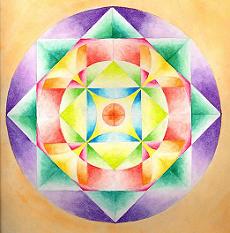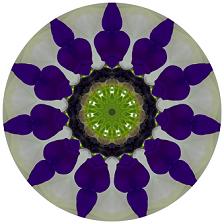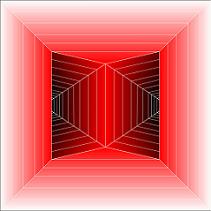Spiritual Depth Perception
 Stereo vision is one of our more fascinating human abilities. Our eyeballs capture 2D snapshots of our environment, and our brains and visual circuitry rapidly combine them into 3D images. So even though our eyes are perceiving reality in two dimensions, by combining the data from both eyes in a specific way, we perceive our visual fields in apparent 3D. This 3D image is richer than either of its 2D components. You could also say it’s a more useful representation of reality than the raw pre-processed data taken in by our eyes.
Stereo vision is one of our more fascinating human abilities. Our eyeballs capture 2D snapshots of our environment, and our brains and visual circuitry rapidly combine them into 3D images. So even though our eyes are perceiving reality in two dimensions, by combining the data from both eyes in a specific way, we perceive our visual fields in apparent 3D. This 3D image is richer than either of its 2D components. You could also say it’s a more useful representation of reality than the raw pre-processed data taken in by our eyes.
The combined input of all five of our physical senses and their submodalities creates a rich and cohesive whole. For example, when you go out to dinner with friends, the sights, sounds, smells, tastes, and textures of your evening create an experience that’s greater than the sum of its parts.
Spiritually we also have access to a rich set of inputs. Unfortunately, most of us are taught to give our attention to a puny subset of those inputs and tune out the rest as irrelevant or misleading. This spiritual blindness can’t help but create functional problems for us. Such problems manifest in many forms, such as depression, loneliness, hopelessness, and meaninglessness. We do our best to adapt and do without, but for most of us, this is an unnecessary handicap.
Just as your physical senses act as lenses through which you perceive different subsets of reality, your spiritual senses also act as cognitive filtering mechanisms. These filters allow you to focus on bits and pieces of pre-processed information which may or may not be useful to you. The more spiritual sensory data you can access and comprehend, the richer your spiritual life will be, and the more accurately it will model truth.
Your spiritual sensory equipment includes:
First-, second-, and third-person viewpoints
*Subjective (consciousness is primary) and objective (physical world is primary) viewpoints
*Intuition and gut instincts
*Feelings and emotions
*Logic and reason
*Dreams and visions
*Religious and philosophical beliefs (Christianity, Buddhism, atheism, skepticism, Darwinism, romanticism)
*Cultural, social, political, and economic beliefs (stereotypes, gender roles, fashion, citizenship)
*Functional beliefs (how to earn a living, what to eat, role of money)
*Personal beliefs (goals, values, expectations)
Suppose you’re cooking dinner for yourself. You can use your eyes to measure the ingredients, your ears to listen for the water boiling, your nose to detect something burning, and your tongue to enjoy the result. If you wanted to do so, you could rely solely upon just one or two of your senses to prepare a meal, but you’d probably find it more difficult to achieve a good result. It could also be a very frustrating experience.
Similarly, when we confront the key spiritual questions of our lives, such as, “Who am I?” and “What is my purpose in life?” we can consult the full spectrum of sensory channels available to us, or we can limit our input to a small subset of those channels. Generally when we limit our input too severely, we end up making things much harder than necessary, much like trying to prepare a meal while wearing a blindfold and ear plugs. This is what happens when we say, “I am only going to consider this one point of view because it’s the one and only truth.”
Perceptual filters
Our perceptions are the lenses through which we view reality, but they are not reality itself. What we perceive is invariably pre-processed to one degree or another. We do not consciously perceive individual photons of light or oscillating atmospheric compression waves. We observe a photograph or a song. Whenever this kind of sensory compression occurs, a tremendous amount of raw data is irrecoverably lost. Each of our senses compresses and repackages the field of perceivable data in different ways, and it is this heavily processed output that reaches our consciousness.
Our beliefs and other cognitive filters give us similar glimpses into reality, but they also provide us with highly compressed and processed after-images of the underlying data. For example, suppose you attempt to perceive non-physical entities. What will you consciously perceive? Through the lens of Christianity, you may connect with angels and saints via the mechanism of prayer. Through an American Indian lens, you may perform a vision quest to consult with ancestral spirits or animal guides. Through an atheistic or skeptical lens, you may perceive nothing at all or perhaps something very fuzzy and uncertain. Through a psychic or mediumistic lens, you may conduct a two-way conversation with a spirit guide or deceased person. What is actually there, however, is none of these things. You don’t consciously perceive reality as it truly is because the raw data would overwhelm your cognitive abilities. Instead you must attend to the highly compressed versions.
 Even though each channel of input has limited expressiveness, if you can access a diverse enough set of channels, each compressed and filtered in different ways, you can develop a more accurate picture of reality. Each belief system you consider provides another way of viewing the same underlying data.
Even though each channel of input has limited expressiveness, if you can access a diverse enough set of channels, each compressed and filtered in different ways, you can develop a more accurate picture of reality. Each belief system you consider provides another way of viewing the same underlying data.
Just as we can augment our physical senses with technology such as night-vision goggles or radio antennae, we can also significantly improve our spiritual senses. Exploring different belief systems and considering unfamiliar perspectives allows us to create new data filters we can then add to our collection of cognitive tools. These filters process the same underlying reality as our other filters, but they’ll present it in unique ways, possibly revealing important patterns our previous filters would have missed. Our eyes may be able to see, but they can see more with a microscope, telescope, and oscilloscope. Similarly, a single belief system gives up some insight into a greater reality beyond the physical, but as our sole filter, it’s full of holes and inconsistencies. Consider the viewpoints of a half-dozen belief systems, however, and the big picture finally begins to take shape.
Mistaken identity
The big mistake we make that limits our spiritual perceptual ability is equating our identities with our beliefs. This constricts our conscious input to tiny subsets of reality, giving us a very shallow and incomplete picture, thereby destroying our spiritual depth perception. For example, if I say, “I am an atheist,” I’m applying a filter through which all my sensory data must now pass. Any information that doesn’t align with that filter will be unable to make it through to my conscious mind, meaning that my mental model of reality will be severely stunted. Just because you have knowledge of certain beliefs doesn’t mean you need to become them.
No single belief can give you a perfectly accurate view of reality, just as none of your physical senses can give you a completely accurate picture of your physical environment. The sum total of multiple inputs provides an invaluable richness, and the more input channels you can simultaneously process, the more accurate your understanding of reality will be, and the more easily you’ll adapt to what is without undo confusion or frustration.
Each of your senses has its own field of dominance, and all have their strengths and weaknesses. Learn to honor all channels of input, just as you respect the individual input of each of your physical senses. You never know when one of those underutilized channels contains a key piece of data that’s important to notice.
While I’ve placed more emphasis on some belief lenses than others in my writing (usually with the intention of counter-balancing the already socially dominant ones), I value the total collection above and beyond any single piece. Consequently, you may read one of my articles and conclude I’m an atheist, another will suggest I’m very new agey, and still others will convince you I’m neither (or just plain neurotic). The truth is that I value all of these lenses, but I don’t equate myself with any of them. As I explained in Podcast #13: Beyond Religion, belief systems are like software running on a PC. A PC can run many different types of software without having an identity crisis. Imagine if your PC happily ran Microsoft Word but refused to let you install QuickBooks, shouting, “Dammit, Jim. I’m a writer, not an accountant.” (Of course, some QuickBooks users would say your PC is doing you a favor.) Yet this is precisely what human beings do when they say, “I’m an atheist. End of story.” Some people will even die to defend their identity, an act which, although some may perceive as noble or honorable, is often performed by those suffering from spiritual sensory deprivation.
 Do your best to avoid the trap of turning any single collection of lenses into your identity. Don’t become the person who says, “I shall completely tune out my ears, nose, skin, and taste buds because they’re inferior to my eyes.” Those other senses may be inferior to your eyes in the realm of visual data, but there will be plenty of situations where they provide useful information that’s situationally superior to what your eyes tell you. Intelligent spiritual development is largely a process of uninstalling identity-based filters that have been unnecessarily limiting you.
Do your best to avoid the trap of turning any single collection of lenses into your identity. Don’t become the person who says, “I shall completely tune out my ears, nose, skin, and taste buds because they’re inferior to my eyes.” Those other senses may be inferior to your eyes in the realm of visual data, but there will be plenty of situations where they provide useful information that’s situationally superior to what your eyes tell you. Intelligent spiritual development is largely a process of uninstalling identity-based filters that have been unnecessarily limiting you.
The more you develop and utilize all of your physical senses, the more complete and accurate your sensory picture becomes. Sometimes the data coming through a single channel you don’t use very often is critical. You may not rely much on your sense of smell, but you’ll be glad for your nose if you smell a gas leak you can’t see, hear, taste, or feel. Similarly, some extraordinary information can come through other input channels you may barely listen to, such as your intuitive or psychic abilities. The more data you tune out, the less accurate your map of reality becomes.
Suitability
How do you know which particular lenses will provide the most relevant information for a certain situation? You figure it out the same way you learn to use your physical senses. Do you ever make the awkward mistake of trying to get to know someone by tasting them? Perhaps when you were a baby you did, but most likely you predominantly use your eyes and ears for that now. Through trial and error, you learned which senses are the most appropriate for each situation.
We still make sensory mistakes, however. Sometimes we become fixated on the wrong input channels. Have you ever caught yourself ogling someone you’re attracted to, not remembering a word that was said? Or have you ever put too much emphasis on your taste buds, shoveling food into your mouth while your eyes are shouting, “You’re getting fat!”
For many situations I find a subjective belief system incredibly useful. When the objective viewpoint is giving me confusing data or mixed signals, considering the subjective side often provides tremendous clarity. But in some situations it’s just the opposite, and I find an objective framework more suitable. I do my best to focus on the right tool for the job, knowing that my senses and beliefs are only low-res maps of a high resolution reality.
Spirituality in stereo
 When you first attempt to perceive reality through multiple lenses, especially those that seem to inherently contradict each other, it will feel like you’re trying to do the impossible. You’ll be like a newborn baby trying to make sense of garbled blobs of light, noise, and pressure. You may feel overwhelmed and frustrated, as if you’re flooding your mind with utterly useless information.
When you first attempt to perceive reality through multiple lenses, especially those that seem to inherently contradict each other, it will feel like you’re trying to do the impossible. You’ll be like a newborn baby trying to make sense of garbled blobs of light, noise, and pressure. You may feel overwhelmed and frustrated, as if you’re flooding your mind with utterly useless information.
Be patient with yourself. With sufficient practice you’ll gradually learn to combine data from multiple viewpoints into a single coherent picture. At first it will take considerable conscious effort as you mentally switch between different viewpoints, asking questions like, “How would a Buddhist view this situation? A biologist? A psychologist?” Eventually your subconscious will learn to do it for you, and you’ll begin to sense a larger picture that merges the input from multiple viewpoints. As this begins to happen, you’ll unlock a new level of clarity, like an infant realizing for the first time the floating blob in front of it is its own hand. It won’t be a perfect clarity, but you’ll likely find that some problems that previously plagued you become much easier to solve.
A good example of the limitations of a fixed belief system would be understanding the intricate connections between your financial results, your religious or spiritual beliefs, and your emotional states. Common cultural belief systems provide a very limited and dysfunctional understanding of these connections, which helps explain why so many people struggle both financially and emotionally. But when you examine the connection from multiple points of view (rich and poor, moral and amoral, happy and depressed, yourself and others), it’s much easier to see the big picture. And this big picture, panoramic view can enable you to enjoy positive emotional stability, financial abundance, and deep spiritual development without so much struggle and unnecessary conflict. (As I’ve mentioned in previous articles, one solution is to center your life around service to others, and trust that the receiving part will take care of itself. The focus on genuine value creation and contribution tends to manifest happiness, wealth, and a sense of meaning in one’s life without too much struggle or effort – IF you can really let go and trust the process. Yet most of us are socially conditioned to overlook the simplicity of this connection. It can seem counterintuitive, so we resist applying it for any length of time. But from the right vantage point, the effectiveness of this solution is readily apparent. Having applied it for some time now myself, I can attest that being happy, fulfilled, and enjoying financial abundance is rather easy if you just steadfastly focus on helping people to the best of your ability.)
Training your spiritual senses
How can you effectively train your own spiritual depth perception? You can do it the same way you train your physical senses. If you want to improve your hearing, take a music class. Find others with different beliefs systems that seem to empower them in some specific way, and learn from them. Study people from other cultures, and learn what makes them tick. Find out why a Buddhist monk seems so calm, why an athlete can maintain such a high fitness level, or why a billionaire is able to enjoy so much abundance. Read books written by such people, meet them in person if you can, and find out what makes them tick.
Through such studies you’ll learn that certain perceptions are more likely than others to yield successful results. For example, if you can’t get yourself to exercise regularly, then obviously you perceive reality differently than someone who is highly motivated to exercise. But if you could learn how an accomplished athlete perceives reality, you could model and assimilate their beliefs. If you learn to think the way someone else does in a certain area, you’ll tend to behave similarly, and you’ll likely achieve similar results.
Beyond social conditioning
Our social conditioning tells us we must turn one particular set of beliefs into our personal identity. Are you a capitalist? A Christian? A skeptic? The way these questions are asked assumes you must respond with a yes or no. But this is like asking if you’re an eye, an ear, or a nose. It would be more sensible to ask questions like “Do you understand the viewpoint of Christianity?” instead of trying to equate your identity with it. When you start linking specific beliefs to your identity, you only limit your ability to perceive what lies outside your (now artificially limited) sense of self.
Sometimes you’ll find that certain thought patterns become so useful that there’s a tendency for them to get folded into your identity. For example, people with musical ability may begin to identify themselves as musicians. Clearly this labeling mechanism is very common and even encouraged. But even when we develop strong patterns like this, we don’t lose the ability to access other frames of reference. Other patterns may degrade from lack of use, but they’re still accessible to us.
One of those strong patterns from my life is eating a vegan diet, which I’ve been doing since 1997. I continue digesting new information on health and nutrition (from pro-vegan, anti-vegan, and neutral sources), but none have come close to dislodging this pattern. But despite all of this, I still retain the ability to access other points of view. I don’t find it useful to access those viewpoints when deciding what to eat for dinner (the thought of putting animal foods into my mouth would turn my stomach), but I often find it useful to access those points of view when dealing with others. I understand the kinds of perceptions that encourage non-vegan food choices, and to lose access to those perceptions would only reduce my ability to function.
Also, by allowing myself access to alternative perceptions, I retain the ability to eat animal foods if I ever find myself in a situation where it seems intelligent or necessary, such as if I find myself stranded in the woods and have to choose between hunting and starving. To be perfectly honest, I can’t be sure what I’d do in that situation because I’ve never been in it. But from where I am now, I believe the most intelligent choice would be to honor my human drive to survive. At the very least, the experience would make a good article.
I find that a multi-spectral philosophy of life aligns closely with what we’d consider common sense. When you find your beliefs incongruent with what your common sense is telling you, perhaps you just need to view the situation from another angle. This is more effective than clinging to a belief that only gets in your way. Your common sense is probably right.
We all have a tendency to fear and resist the unknown, so the notion of giving your beliefs so much flexibility may give you pause. Will you lose your sense of self? Will you become totally amoral? Will you devolve into one of those deranged blogger types? In my experience these worries are unfounded. Allowing yourself a greater richness of perceptual channels will only increase your ability to make accurate decisions that align with your values and morals. First you view a situation from many different angles, remaining as open and nonjudgmental as possible. Then you bring your personal values and identity online to use in making decisions and taking action.
The point of this article is to help you make conscious choices based on accurate input. Cloudy or incomplete perceptions reduce your ability to make intelligent choices. The richer your perceptions, the better your decisions will be, so rich perceptions can greatly enhance your ability to live consciously, and that in turn benefits all the lives you touch.
About The Author
Copyright 2007 by Steve Pavlina -
StevePavlina.com
[an error occurred while processing this directive]
Home » Spirituality Links » Unique Spirituality Articles
» Spiritual Depth Perception



 Articles
Articles